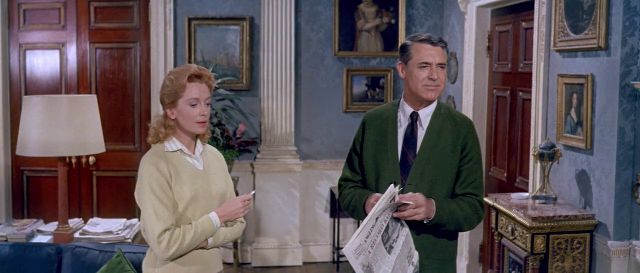The Grass Is Greener (1960) 
“Variety is the spice of life!”

Director: Stanley Donen
Cast: Cary Grant, Deborah Kerr, Robert Mitchum
Synopsis: Victor and Hillary are down on their luck to the point that they allow tourists to take guided tours of their castle. But Charles Delacro, a millionaire oil tycoon, visits, and takes a liking to more than the house.
The Grass is Greener opens with some clever credits in which the duties of those credited are sort-of acted out by babies. For example, when the cinematography credits are on screen we see a couple of the little tots playing with a toy camera, and when the director credit appears we see one little chap yawning hugely. It’s a cute, ingenious start to a middling movie which finds it impossible to shake off its stage origins and suffers from a memorably poor piece of casting.
Victor Rhyall is an Earl who depends on the income derived from allowing members of the public to traipse around his stately home to maintain its upkeep and keep him in at least a semblance of the lifestyle into which he was born. His wife, Lady Hilary Rhyall (Deborah Kerr), helps out by growing and selling mushrooms. They have what seems to be a contented marriage which has clearly fallen into a familiar routine, although Hilary displays some signs of restlessness which Victor either misses or chooses to ignore. This restlessness is suddenly drawn into sharp focus, however, when American oil tycoon Chalres Delacro (Robert Mitchum) strays from a guided tour and (perhaps deliberately) into one of the rooms prohibited to tourists, where he comes upon Hilary, sparking an instant attraction between them.
A few days later, Hilary organises a hairdressers appointment in London in the hope that she will run into Delacro, while he sets about tracking down the name of her hairdresser so that he can lurk about outside until she emerges. Hilary tells Victor that she’s staying with her friend, Hattie (Jean Simmons), who also happens to be an old flame of Victor’s, but Victor’s suspicions are proven right when Hattie show up at his home. Now most men faced with such irrefutable proof of their wife’s infidelity would be hot-footing it to London to confront the lovers, but Victor takes a different approach: he invites Charles to stay over so that he can perhaps undermine the other man’s position in his wife’s heart.
There’s a lot that’s wrong with The Grass is Greener. Firstly, as with so many adaptations of stage plays, the opening act is nearly all exposition in which the dialogue of the chief characters serves to provide the audience with a clear idea of the type of person they are. This means a lot of talk and very little actually happening, and the opening half-hour of The Grass is Greener drags quite badly. It also does a particularly poor job of convincing us that a woman who had previously expressed only a vague dissatisfaction with her marriage can, in the course of a ten minute conversation, become hopelessly infatuated with this brash, forthright American, whose self-confidence borders on arrogance most of the time. And while Robert Mitchum might seem a reasonable choice for the part on paper, he’s an altogether different prospect on celluloid. The way he plays the part of Delacro, his character possesses neither the qualities necessary to attract a woman like Lady Hilary nor the depth of emotion necessary to want to steal her from her husband.
And this willingness of Delacro’s part to literally walk into another man’s home and steal his wife makes it virtually impossible to like him, no matter how debonair writers Hugh Williams and Margaret Vyner try to paint him. It’s simply not possible to like such a character, but it’s clear that’s just what Williams and Vyner want us to do. The differences between Victor and Delacro are a microcosm of the differences between the British and American man. Victor is charming but reserved, a product of a long history, but a history which has bestowed upon him certain privileges which have made him soft and complacent, whereas Delacro is something of an action man who has built an empire through rugged brawn and determination. This is then reflected in the marriage of the Rhyalls, which is as complacent as any marriage can be, and the life of excitement apparently offered by Delacro.
After that rather slow opening half-hour, the movie becomes more interesting as it comes to grips with its real subject matter. A sophisticated battle of wills emerges from a near-farcical situation, and almost every line of the clever script has a double-meaning. Grant, in particular, has a lot of fun with this verbal sparring, easily running rings around Mitchum, who at times seems almost bovine by comparison. Deborah Kerr, with her cut-glass accent and English Lady manners seems an unlikely object of two men’s desire, and she comes across as too much of a together person to persuade us of the vacillating nature of her character. Overall though, The Grass is Greener is a movie which those who watch to the very end will find more rewarding than those who give up halfway through.
(Reviewed 23rd December 2013)
httpv://www.youtube.com/watch?v=KIRHjiBCut4
